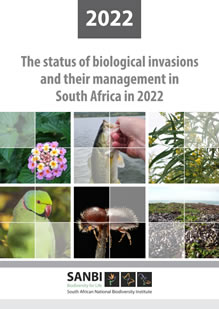Minister Creecy launches the 3rd National Status of Biological Invasions and their Management in South Africa
08 March 2024
Biological invasions are a major threat to South Africa's water security, threaten sustainable agriculture, exacerbate wildfires, and have ongoing negative impacts on the country's unique and globally important biodiversity.
"We must continue investing in research and innovation, supporting studies that enhance our understanding of invasive species dynamics to improve management strategies. The 3rd National Status report on Biological Invasions serves as a clarion call for action reminding us of the urgency of the situation and the imperative to act decisively," said the Minister of Forestry, Fisheries and the Environment, Ms Barbara Creecy.
This phenomenon is not unique to South Africa, prompting the recent Intergovernmental Science-Policy Platform on Biodiversity and Ecosystem Services (IPBES) - Invasive Alien Species Assessment to focus on biological invasions. The 3rd National Status of Biological Invasions and their Management in South Africa positions South Africa strategically to align with international efforts guided by the Kunming-Montreal Global Biodiversity Framework (GBF).
"Addressing the challenges posed by biological invasions requires a coordinated and collaborative effort. No single entity can tackle this issue alone. Government, academics, civil society organisations and communities must come together, pooling their knowledge, resources and expertise to develop effective prevention, early detection and control strategies," said Minister Creecy.
The Bio-Invasion report will also support the implementation of the White Paper on Conservation and Sustainable Use of South Africa's Biodiversity as well as target 6 of the GBF which calls for the reduction of invasive alien species by 50% by 2030.
The scientific report launched today, co-produced by the South African National Biodiversity Institute (SANBI) and the Department of Science and Innovation's National Research Foundation's (DSI-NRF) Centre of Excellence for Invasion Biology, made several key findings:
Firstly, new alien species continue to arrive in the country every year through several different pathways, with the rate of introduction remaining stable at around three new alien species per year. Over the last decade (2013–2022), 32 new alien species were either illegally or accidentally introduced. This is slightly lower than the numbers seen for 2010–2019 which were an average of about four new species introduced per year.
South Africa has an innovative regulatory system to address biological invasions with decisions on the management of the alien species directly informed by the available scientific evidence. All legal introductions of new alien species require import permits, with permits issued only if the risks are demonstrated to be sufficiently low. In addition, the new National Border Management Authority has committed to improve the prevention of illegal and accidental introductions.
Secondly, invasive species, in particular trees and freshwater fishes, have 'major' negative impacts on people and nature across the country by reducing South Africa's water resources, degrading pasturelands and exacerbating fires. In mountain catchments, we are seeing pine trees using up water, increasing the intensity of wildfires, and crowding out biodiversity. Alien freshwater fishes are invading our water resources, reducing the diversity of our native fishes and other aquatic organisms. The South African government invested over 1.5 billion Rand to address biological invasions between 2020-2022; targeting priority areas, such as strategic Water source areas, protected areas, and biodiversity hotspots. This has also created much-needed employment, especially in rural areas. Several notable initiatives by NGOs have raised over R180 million from the private sector to fund the control of invasive freshwater fishes and alien plants in the water catchments of Cape Town. This model could be replicated across other catchments and priority areas.
Thirdly, invasive species are devastating the unique and sensitive biodiversity of the Prince Edward Islands. For the first time, this report provides a separate assessment of the status of biological invasions and their management on the Prince Edward Islands. Although these islands are part of South Africa, their remote location and unique biodiversity warrant a separate assessment. Findings highlight the devastating impact of the house mouse, which is alien to the Marion Island. The mice feed on plants, and small animals including endangered seabirds. A bold plan to eradicate mice from the island has been developed and is due to be implemented in 2027. The eradication of mice from Marion Island is essential if its unique biodiversity is to be preserved.
Link to the report: https://www.sanbi.org/resources/documents/
For media enquiries contact:
Peter Mbelengwa
Cell: 082 611 8197


